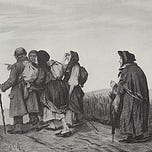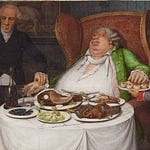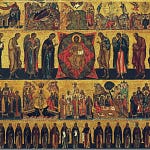This is an updated version of a talk originally given at the Western American Diocese Pastoral Conference in San Francisco, CA, 18 March 2014
CONTINUED FROM A PREVIOUS POST
FASTING FOR NON-MONASTICS
Fasting and Life’s Seasons
Our life is not one uniform and monotonous continuum. Rather, it is a variety of seasons. Some easily come to mind - childhood, adulthood, old age - but there are others: pregnancy, for example, or preparing for an exam, or training for a competition, or travelling. We will touch on all of these, but let us begin with the natural seasons of our life: childhood, adulthood, and old age.
Most of us probably know that infants, with the notable exception of Saint Serguis of Radonezh, do not fast. It is said that the baby Serguis (whose name was Bartholomew before he became a monk) refused his mother’s milk on Wednesdays and Fridays, but even in this miraculous account we do not read that he abstained from milk during longer fasts, of which there would have been four in his first year of life. There is a limit to how long a baby - even one chosen by God - can go without milk.
At about the age of three, a young child may be taught the basics of self-control. At that age, there is still no need for a child to follow a monastic fasting rule, but even a three-year-old can be taught to give up a cookie on Friday.
From approximately seven years of age, children should be mostly eating what the parents eat, perhaps with minor adjustments. The idea that a child eats from a special “kids’ menu” of unhealthy options is not good for either the child or the parents. Of course, it is assumed that the family follows the fasts of the Church. A parent, for example, may experiment with eating only once a day after vespers, but a child probably should not - at least, not for forty-nine days straight; although, an occasional skipped or smaller-than-usual meal is not a bad idea. Even if a child wishes to try some stricter asceticism, a parent will naturally want to guide the child in ways that are age-appropriate. Such experimentation may be extremely useful as a training tool for future asceticism. Whatever the parents decide is appropriate for their child, there is no need for indulgence and catering to the child’s every whim and demand.
Being a teenager or young adult is another one of life’s seasons. This is a season of many stresses in life: school, sports, romantic relationships for which young people stay up half the night and then feel lousy for most of the next day. All of this makes it very difficult to add yet one more stressor. Fasting is in fact a stressor. When one fasts, one has to exercise will power; one has to control oneself, limit one’s appetite, and think ahead. But this season in life is also when young people really need to practice the skill of self-control and self-discipline. They are no longer children, and their parents are not always there to serve as their backbone. By now, they had better have their own backbone. This is why it is so important to begin fasting in some way and learning self-discipline when they are still young children. One of the advantages of teenage years is that most healthy youths do not have to pay too much attention to the exact numbers of various nutrients, such as protein. Their bodies are full of vitality, very efficient, and can function perfectly well on simple healthy food whether or not the exact proportions of nutrients are observed. Of course, any body begins to falter if it is being starved, but this is hardly a pressing concern for most people in the U.S., including young people.
Following the turmoil of the young adult years, roughly half of the young people will get pregnant. Guys may think that this does not apply to them, but the Affordable Care Act does cover pregnancy benefits for young men. So, fear not! Jokes aside, however, pregnancy had better not be solely a young woman’s experience, but that of the couple. Care, love, support, understanding, and - yes! - cooking is what guys get out of this experience. There is absolutely no good reason for a pregnant woman to follow the monastic diet, and I am certainly not aware of any Church rules that say otherwise. Yet, pregnant women do not have to forgo fasting - just the monastic rules. Their fast can be eating as healthily as they can, which is a discipline in and of itself. If it is healthy - eat it; if it is not - do not eat it, even if it does not contain meat or dairy. This does not mean that a pregnant woman should stuff herself on meat at every meal. This would not be healthy, especially if we are talking about processed meats full of sodium and nitrates. But the season of pregnancy is not the time for only bread and water after vespers. To be sure, there are plenty of vegetarians who never eat meat - not even during pregnancy - and deliver healthy babies who also grow up not eating meat. One does not have to eat meat just because one is pregnant. But neither does one have to follow a monastic fast.
Listen to this episode with a 7-day free trial
Subscribe to Phroneo to listen to this post and get 7 days of free access to the full post archives.











